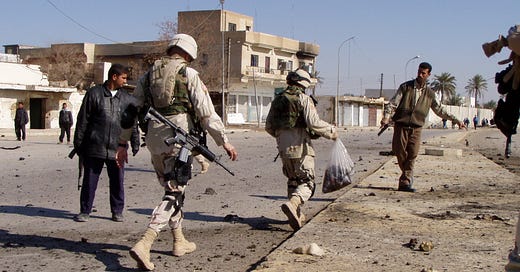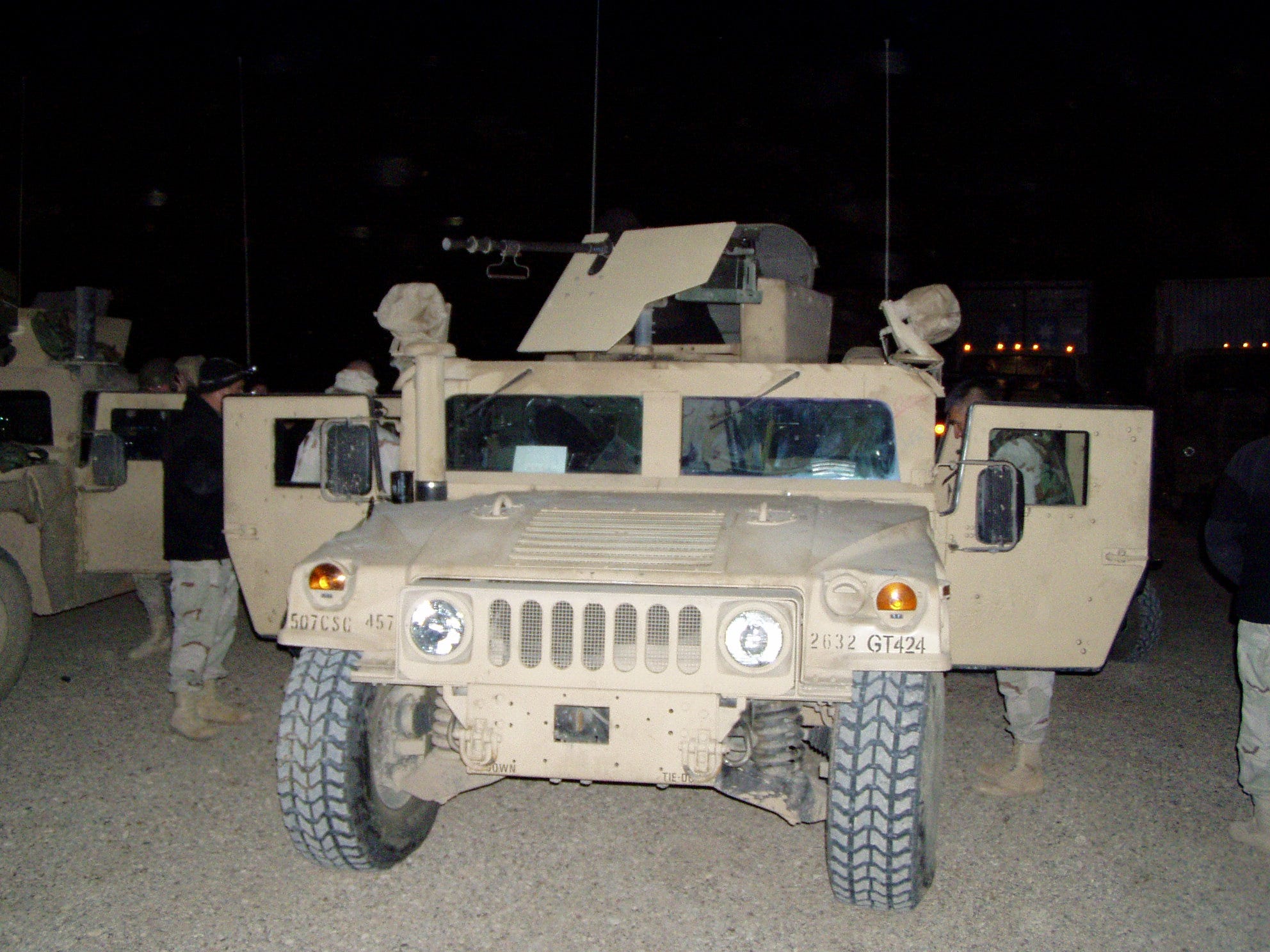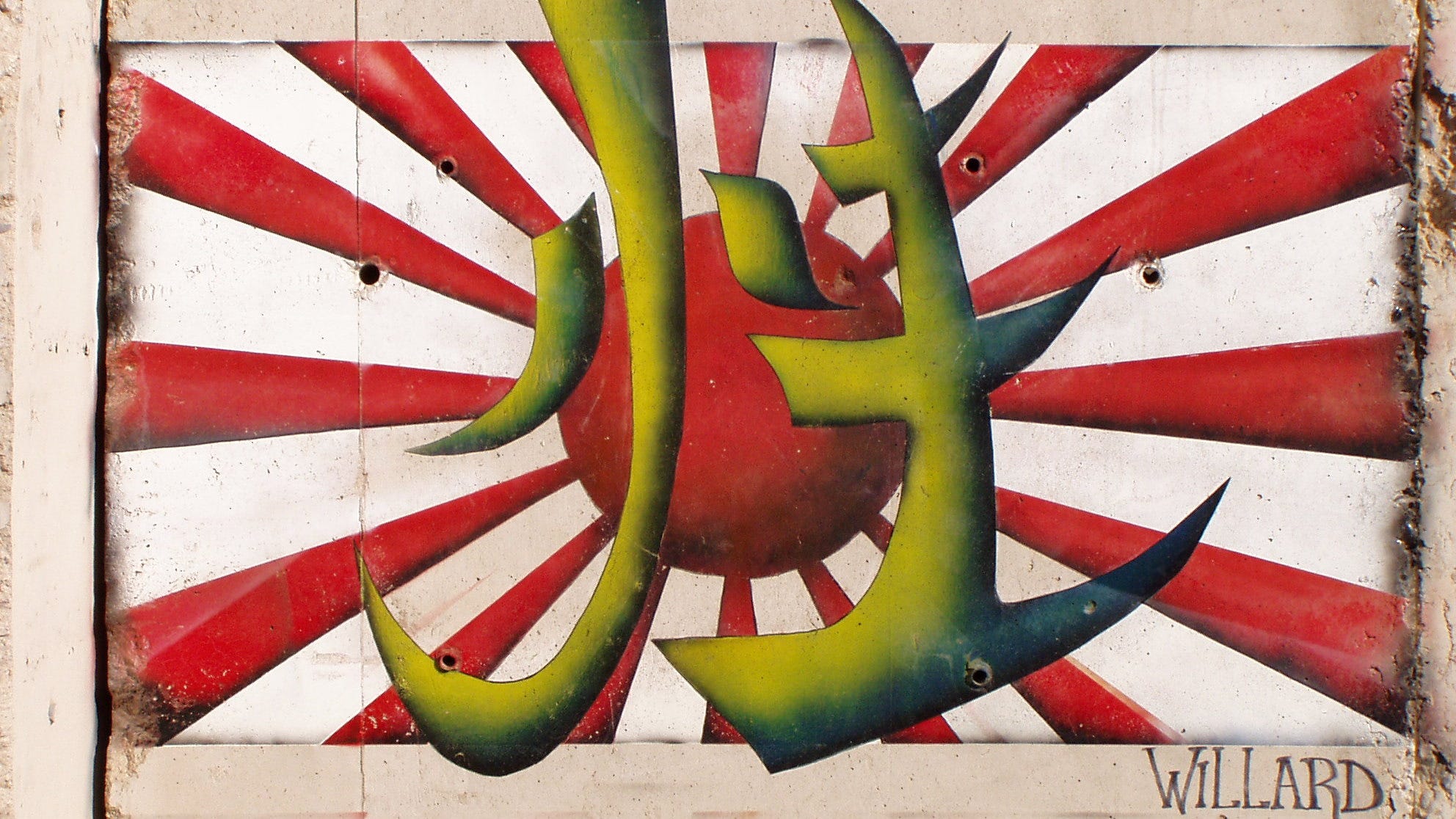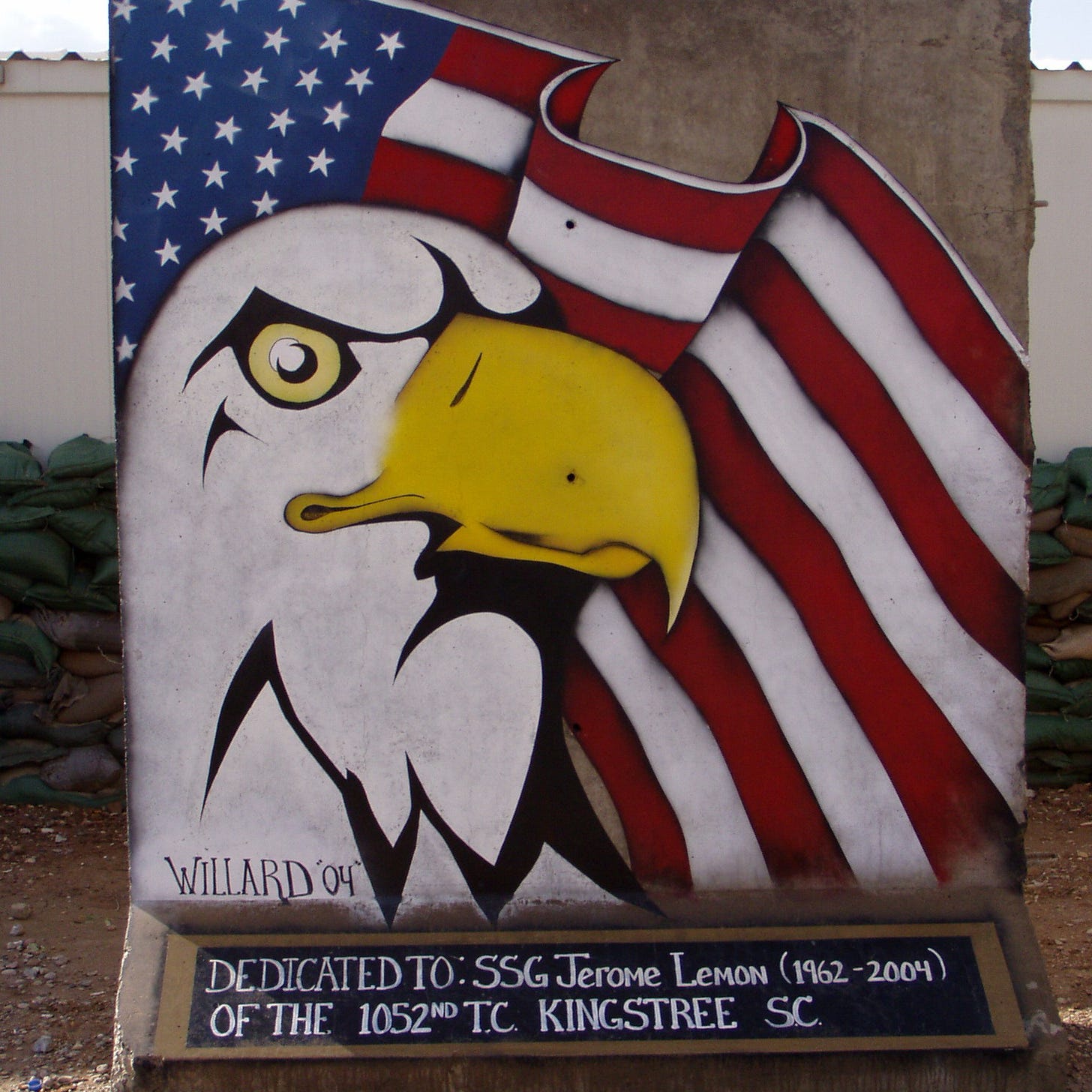
Another day, another convoy. More than a week into my January 2005 embed with the South Carolina National Guard’s 1052nd Transportation Company, hauling supplies across Iraq from Anaconda, a logistics base in Balad, I didn’t have jack shit to write about.
Then there was Abney.
I was waiting in the rain for a convoy to get its shit together when he came sloshing through the mud towards me, his shoulders hunched against the cold drizzle, dodging darting drivers and gunners making waves to their rigs.
All around him, trucks and Humvees were thrumming, coughing diesel exhaust into the roiling darkening sky. Reaching out, he took my arm. “You press?” he called over the noise.
I eyeballed the soldier, hesitating just to prove that there was no one who could make me hurry. I’d been with the 1052nd only a week, but it felt like years—years that had made me real grumpy. “Yeah, I’m press,” I said. What’s it to you?
He sidled closer. “You gotta help us. My name is Abney. Me and Willard are trying to extend.”
“Uh-huh. And what does that mean?”
“Everyone else is leaving in two weeks, but we want to get permission from the National Guard to stay here at Anaconda.”
Stay? “You don’t want to go home?”
Abney glanced at the rows of trucks. Gunners were climbing in with their M-16s. Drivers played with gear shifts, revving engines, getting a feel for their rigs. The gun trucks were all buttoned up, .50-cal. gunners leaning from the roof turrets swathed in polypropylene and Kevlar, their faces concealed by dark goggles spotted with rain.
The invisible sun was setting and the convoy was ready to move out. Abney licked his lips. “Look, I gotta go,” he said. He grabbed my soggy notepad and scribbled his email address. “Email me, okay?”
That was easier said than done when getting email access meant waiting in line at the cavernous morale facility that was always crammed with privates loudly playing Playstations, soldiers and contractors calling home on the satellite phones and gassy NCOs sprawled in the folding chairs with boxes of popcorn on their bellies, watching bad movies on the DVD projector. I nodded but I didn’t mean it.
There was something about life at Anaconda that bred apathy—and fast. Maybe it was all the concrete and gravel as far as the eye could see. Maybe it was the daily drag of long boring missions on featureless roads. Maybe it was the casualties, one a week, like clockwork.
Maybe it was the injustice of it all, risking your ass every day to haul bagels and toilet paper to a bunch of seemingly ungrateful, overfed infantrymen. Whatever. This Abney guy was different, apparently, and anything but apathetic. I watched him plow through the rain and mud to his rig, his chin tucked, his jaw squared, putting on his game face for the mission ahead.
I made a mental note. Email him tomorrow. Just to see.
Despite everything, Abney would rather be at Anaconda than back home—and so would this Willard guy, apparently. I knew why I wanted to be here, but for me, “here” was Iraq, not Anaconda.
By my standards, Anaconda was the anti-Iraq, a place that promised you combat but never consummated. Anaconda was a tease—a wet, cold, tedious tease. Why in the world would Willard and Abney want to stay here? And what made them think I would help?
After almost a year in-country, the 1052nd was going home soon, to most everyone’s profound relief, and I imagined nobody was in the mood to bother with the phone calls and paperwork it would take to get Willard and Abney transferred to a unit that was staying. Willard and Abney probably thought a little negative press would change their commanders’ minds.
As I climbed into the gun truck I’d been assigned to for this mission, the patter of rain on the windshield got louder and louder until the raindrops flicked the glass with loud cracks. Outside, a billion raindrops poked a billion dimples on the darkening field of cold mud that me and Abney and this guy Willard called home.
Despite the cold wind gusting through the unheated cab, despite the rings of ice forming on the edges of undisturbed puddles in remote corners, the whole world looked like it was boiling.
Now that my interminable, pointless days at Anaconda had complicated the issue, I wasn’t always sure how I felt about Iraq—but I was sure I wasn’t ready to leave. A week and a half with the 1052nd and a half-dozen wet, boring, uneventful nighttime convoys to miserable little bases all over the Sunni Triangle hadn’t given me much to write about. I needed to get away from Anaconda, away from the 1052nd, out into the cities where, I imagined, stories waited.
Tomorrow was another rain day. I slept in then braved a cold drizzle for a greasy omelet at the chow hall. Coming back, I bisected the block of trailers shared by the 1052nd’s lower enlisted—“the ghetto,” everyone called it—easing between the T barriers, those upright concrete slabs meant to absorb shrapnel from the occasional mortar round the insurgents manage to drop on Anaconda, double-timing across a road long ago churned to butter by rigs and Humvees, medium trucks hauling stuff from one side of Anaconda city to the other, weird mine-clearing vehicles with their high cabins, whipping antennae and articulated arms and thin-skinned Halliburton buses driven by Filipino contractors, heading to my trailer in the NCO’s block.
I was contemplating a mid-morning nap followed by a trek to the morale center to email Abney when someone knocked on my door.
“Who is it?”
“Willard.”
They’d beat me to the punch.
Willard looked like a hobbit: short, stocky and smiley. He wore a black knit cap on his head. He held up a finger-size flash drive and said, “You the reporter? I have something to show you.”
Walking with Willard to his hooch in the ghetto, we talked about everything but what was on our minds. It turned out we were both from Columbia—“Small war, huh?” he said—and that we haunted some of the same bars and restaurants and knew the same local heroes and barflies.
But the sames went only so far. I had a master’s degree; Willard was more a community college kind of guy. Would we have been friends back home under normal circumstances? Would we even have talk?
Probably not. But this wasn’t home—and if these circumstances were normal then we were fucked.
We shared an interest in art. I’d parlayed that into a creative writing degree before selling out to journalism. Willard had joined the Army, had gotten his ass deployed to Iraq and—what do you know?—had found it the perfect venue for his painting. All of Anaconda was his canvas.
Skirting the ghetto, we arrived at one of Willard’s pieces, a concrete T barrier spray-painted in rippling red, white and blue stars and stripes. Against the backdrop of the flag there was the head of a muscular bald eagle, and under the eagle, in yellow, “Dedicated to: SSG Jerome Lemon (1962-2004) of the 1052nd T.C. Kingstree S.C.”
Willard leaned against the T barrier, grinning photogenically so that I had no choice really but to take a picture. He held the pose until he was satisfied I had gotten several good shots. Then he beckoned to a second piece around the corner, this one a big golden Japanese character that Willard said meant “sex.” Again he posed, grinned and waited until I’d taken pictures.
“You really like it here, don’t you?” I said after the last click.
Willard only shrugged and headed for the ghetto. “This isn’t what I wanted to show you,” he said over his shoulder. “Come on.”
The place he described as we walked was far different than what I’d seen in my little corner of Anaconda. In the NCOs’ and officers’ blocks there was peace and quiet and unlocked doors, and never anybody around because who had time when there was all this paperwork?
But here in the ghetto there was time, especially in weather like this, and where there was time, and where there was poverty, there were drugs, crime and porn, three things that, according to Willard, Anaconda had in quantity but that nobody much talked about.
Here in the ghetto you kept your door locked all the time, and even then people would break in. After a year here, most everybody had got amenities: DVD players, Playstations, nice T.V.s, stereos, whatever. They bought them at the post exchange or they ordered them online or their parents sent them from the States.
With all the nice toys in country and so little of it getting shipped back home at the ends tours—shipping was real expensive, you see—it tended to get resold, gifted and accumulated. Ownership started to get a little blurry, making stealing it even easier.
Stolen goods got sold for cash—which was nice considering the Army limited how much of your paycheck you could withdraw while deployed—and cash got swapped for the shit you couldn’t get in the P.X. but could at the little booths run by Iraqi vendors. Hadji shops, they called them.
Hadji had candy, cigarettes, bootleg movies for a dollar and even pills, porn and booze if you asked nicely and kept your voice down. Thanks to the hadji shops and a few enterprising American middlemen, there was a thriving black market at Anaconda for everything the Army discouraged or outright banned.
And it seemed Willard was a major consumer. Opening the door to his trailer was like shoveling garbage: drifting debris got scooped up and swept aside, stuff spilled from piles and crunched underfoot.
Willard’s trailer was like something out of Platoon. There were big-breasted nudes slathered on the walls, empty bags of Doritos on all the chairs, stacks of C.D.s and DVDs, soiled uniforms hanging everywhere, the flavor of smoke and feet in the air and some spaced-out half-naked soldier half-buried in old magazines.
The dude was a fixture, it seemed; he barely looked up when Willard planted me in a folding chair and locked the door behind us. He fired up a battered laptop. The Windows logo was grotesque in this context, and it was a relief when it ceded the desktop to Willard’s wallpaper, an overexposed photo of himself posing grinning in front of a Humvee in some desert setting, Kuwait most likely.
That grin was the same he’d worn showing off his art.
Navigating his desktop, Willard talked about his extensive stocks of video porn, all downloaded from his favorite website. On the Army networks you couldn’t access pornographic sites, Willard explained, so he had to get his own personal internet connection through a local vendor. Cost him a few dollars a month, he said, and that was actually pretty expensive considering the dollar’s strength in this teetering economy.
But never mind the porn … after clicking on a folder full of thumbnailed images and starting up a slideshow, Willard folded his hands behind his head and leaned back in his chair. “This,” he said, “is what I wanted to show you.”
Images flashed.
I felt my eyes go wide before I even understood what I was seeing. I involuntarily gripped the metal seat of my chair. In my peripheral vision I saw Willard watching me watching the blinking images on the computer screen. He grinned that old grin.
It was a stop-motion nightmare, frozen horrors replacing frozen horrors in a limping, stumbling syncopated rhythm, no context, no explanation, no story at all save what was apparent in the disposition of the survivors, corpses and pieces of corpses, what they were wearing, where they lay, what injuries they’d suffered.
Here was an Iraqi child, rich or middle class judging by his white tunic, still crisp where it wasn’t soaked crimson or scorched black. He was 10 years old, maybe 12, hard to tell exactly when his face was all burned meat and blisters and bloody eyes. He lay on a cot, at a hospital perhaps, staring at the photographer without an emotion or thought in his red eyes—maybe, mercifully, because he was so full of drugs that he was barely conscious anymore and hopefully couldn’t recall the bomb, artillery shell or grenade that had blown off his face and pierced him with pieces of himself, his own clothes and his surroundings.
Next, a grown man in a new blue jogging suit, a rich Iraqi, a young man obviously even though he was face-down in a concrete gutter in a pool of red so rich and thick that you could’ve painted roses with it, trickling from the scooped-out back of his skull where some assassin’s bullet had scrambled his brain and tumbled him mid-stride, halfway between where he had started and where he’d been trying to get but had failed, in a filthy city somewhere, Baghdad perhaps or Baqubah or Balad or somewhere else where Iraqis killed Iraqis—for only Iraqis did this to each other. Americans were less precise and used bigger guns …
Now somebody’s dead donkey, on its side squirting its guts from its belly bomb-wound, still strapped to its overturned vegetable cart, its owner, some innocent bystander or poor shopkeeper most likely, nowhere in sight but uninjured, one could hope, since his guts were nowhere to be seen …
Now two bare feet poking from a tarp in the bed of a truck—Iraqi feet, obviously, since Americans wore shoes and didn’t haul their dead around in pickup trucks.
It was a shuffling parade of the dead and damned, Hell’s photo gallery, Willard’s personal collection, his pride and joy, culled from the collections of other voyeurs over the course of a year. Somehow, it was his explanation for why he and Abney wanted to stay in Iraq when even the Army wanted him home.
The slideshow changed, from photo after photo of maimed Iraqis to loving portraits of some of the machines that did the maiming. There were Abrams tanks leaping over berms, sand spraying from their treads like ocean surf. There were fat Bradley infantry carriers trailing radio antennae, racing into danger against a backdrop of inky smoke and orange flames.
There were A-10 Warthogs, those ugly smiling twin-engine attack jets with the massive auto-cannons in their mouths that made sounds like dragons belching when they spewed molten uranium to disintegrate everything in their paths, screaming over the turrets of tanks and Bradleys.
There were elephantine artillery pieces, mortars spitting baseball-sized shells, helicopters of every shape and size frozen mid-ballet over the charred hulks of ruined Iraqi tanks.
It was as if the world were contested by steel dinosaurs, and this was the still-life ballad of their apocalypse. Nowhere to be seen were the men that made the machines fight and the men dying inside the machines that succumbed. Me and Willard had both missed the combat phase of the invasion, so we shared the same perspective on the mechanized mauling that had brought Saddam Hussein’s government tumbling down.
From here, like this, it looked awesome, heroic, fun.
On the other hand, the war wasn’t like that anymore, at least not at Anaconda. There was no more dinosaur combat. There weren’t so many helicopter ballets. At Anaconda it was beans and bullets, highways and grease pits, long muddy winters, dirty cotton socks, boredom, bad food and roadside bombs that blew you to pieces without warning or the satisfaction of dying to win some battle.
Speaking of which, the slideshow transitioned again, this time to a snapshot of a burning big rig on a road that looked somehow familiar. Here Willard reached out, clicked his mouse, paused the show then leaned back with his fingers steepled, peering between their eaves at an image that meant more than the rest did.
I spied the date digitally imprinted on the photo’s corner—Oct. 27, 2004—and connected the dots. “That’s—”
Willard nodded. “Lemon’s truck. That was one rough day for everybody.” He cleared his throat, looked down, whispered, “They found his head on the floorboard.”
“And you still want to stay?”
He shrugged. “It’s an … adventure?”
Sure, in theory.
But there was more to it than that. Where in the States the dead and dying were swept off the streets in ambulances, locked in hospitals and morgues, slathered in makeup for presentation and buried in closed caskets at ceremonies where everyone stood at a distance, here in the wild east, death was part of the landscape.
Even when there weren’t actual bodies in the streets, there was a dirty organic texture to Iraq that was like an open wound. We were all blood, guts and shit. We died easy and wetly. That was possible to ignore in the United States. But here in Iraq …
I reached out, took the mouse and clicked back to the drugged, burned little kid. “Let’s see that again.”
Let’s see flesh and blood, violence and consequence, life and death. Let’s see what the world’s really made of. Let’s look it in the eye and try not to blink. Let’s be men.
“Yeah, it’s an adventure,” I said, totally mistaking present tense for future.
I relinquished the mouse, glanced at the half-naked dude in the corner—he hadn’t looked up from his magazine—then pulled out my notepad and a pen and said, “So you and Abney want to extend. Tell me more.”
An hour later, I stepped outside into a cold gray afternoon. It was raining again, albeit lightly, and in the distance a siren blared, echoing off Anaconda’s shambling architecture and expansive gravel fields. I shivered, and not because I was cold—even though I was. Walking home, I reviewed my notes.
extending = voluntarily staying in theater beyond required term
can transfer to recently arrived unit
national guard units get federal funding based on number of soldiers on rolls, so transferring out w + a means 1052nd loses funds to another unit
fuck the 1052nd
who can make this happen? gov. sanford? senators? reps? give email addresses
you can make it happen too
But did I want to? You couldn’t observe a thing without affecting it, but so far I’d managed to stay pretty hands-off. Helping Willard and Abney meant getting involved, taking a stand, aiding the war effort in a conflict I barely understood and didn’t really care to.
And what if they got extended and got killed? Did I want their blood on my hands, not to mention the blood of any Iraqis who might die at Willard’s and Abney’s hands? And did I really want to take on the 1052nd’s leadership, however indirectly?
Hell yeah, I do.
That settled it. I’d help Willard and Abney. I’d hook them up with their governor and their Congressional delegation. I’d make their plights public. I’d fight the 1052nd’s attempts to take Willard and Abney home—not for Willard’s and Abney’s sakes, but because it was a story.
I would write about Willard and Abney because, so far, they were the only things here worth writing about. So be it if half the story was the story itself, my journalistic lobbying for my fellow war aficionados.
Little did I know, later, as I sat down in my lonely little trailer to write the first of several stories about the transportation unit from Kingstree and its two weird wayward war junkies, that I’d succeed, that with the governor’s help Willard and Abney would get their extensions, and that they’d both spend several more months in Iraq, and survive.
And that when Willard got home to Columbia, the first thing he’d do was send me a note saying thanks, but that I wouldn’t be there to get it because I’d be back in Iraq myself on a second trip, having fought tooth and nail for new assignments to the war zone.
Having, in other words, extended.
Read more:
The Shooting Gallery at the Iraqi State Fair
J.J. laughed and shook his head. Through the rain-spattered windshield of his truck, down the road in the dark, we were watching two mud-caked rigs from the 1052nd Transportation Company fighting for position, backing, turning, hesitating, deferring, dancing the dance of the incompetent and confused, succeeding only in throwing the entire…








